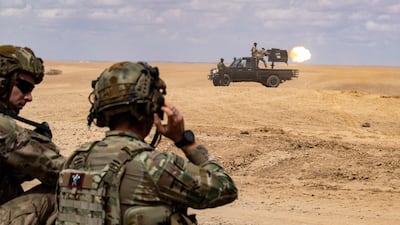The internationally backed Syrian Democratic Forces, which led the fight against ISIS in north-east Syria, has stopped all joint counter-terrorism operations against the group after Turkey launched attacks on its positions.
The SDF is preparing for a ground invasion by Turkey, after President Recep Tayyip Erdogan's announcement last month that "tanks and soldiers" would soon cross the border following a bombing in central Istanbul that Ankara blames on Kurdish separatists.
“All co-ordination and joint counter-terrorism operations with the coalition [against ISIS]” had been halted, SDF spokesman Aram Henna told Reuters on Friday.
Turkey has carried out extensive shelling of SDF positions in Syria since the bombing, which a former senior US official in the coalition said had killed key personnel in the fight against ISIS.
"In recent months, the SDF has had members of its anti-terror forces killed by Turkey, including a commander of the anti-terror forces Jiyan Tolhildan, a senior commander of the most elite special operations anti-terror forces of the SDF," Col Myles B Caggins III, former spokesman for the US-led coalition against ISIS, told The National.
"A few days ago, more anti-terror troops in Hasakah were killed in Turkish raids. These troops were trained by US Commando Special Forces."
He said another reason for the halt in operations was the need for using "intellectual energy or planning" to protect north-eastern Syria from a potential ground invasion.
"The SDF is still going to have checkpoints and local security points but they are pausing some of the more sophisticated raids," Col Caggins said.
Turkey has blamed a bombing in central Istanbul on November 13, which killed six and wounded 81, on Kurdish separatist groups it sees as the same as the factions that make up the SDF.
The SDF, a grouping of factions led by Kurdish forces, has denied any involvement in the attack.
The SDF conducts most of the anti-ISIS operations with US forces helping in intelligence gathering through helicopters and drones, Col Caggins said.
With SDF forces focused on preparing defences against Turkey, US forces on the ground have also effectively halted counter-ISIS operations.
"Now we just have US troops sitting on the SDF bases and waiting for the situation to pass so they can resume collecting intelligence and planning operations against ISIS," the colonel said.
The SDF received extensively funded training and equipment as they led the ground attack on ISIS that defeated the group in Syria in 2019.
Sporadic ISIS attacks and bombings still take place and the coalition assists the SDF in raiding sleeper cells. It also guards tens of thousands of former ISIS fighters, their families and international recruits who travelled to join the group in Syria.
Despite warnings from both Russia — which backs Syria’s President Bashar Al Assad — and the US — which backs the SDF — not to launch an invasion of north-east Syria, Turkey has been shelling positions and preparing an attack.
Although Turkey says it is targeting militant Kurdish separatists for the attack in Istanbul, Col Caggins says the shelling is already affecting civilians in the region.
"All those attacks from Turkey are a massive distraction and are causing despair and terrorising civilian populations all through northern and eastern Syria, including a variety of people like Christians, Muslims, Kurds, Turkmen and Assyrians," he said.
"They're all under duress and there is likely to be more mass migration and refugees into the Iraqi Kurdistan region, which is even more troubling because winter is approaching."

Col Caggins said Turkey had already bombed and caused damage to vital infrastructure including grin silos and power stations, which are vital for providing heat during the winter.
There is also the risk of escalation with local, pro-Damascus and international soldiers on the ground in north-east Syria.
Farhad Shami, the head of the SDF media centre, confirmed to The National that Russia had sent reinforcements to one of its bases near northern Aleppo in anticipation of a conflict in the north-east.
Mr Shami said the SDF did not have a big presence in that area, but confirmed that Russian heavy weapons were deployed "for the first time" at the base.
He said: "We are in continuous conversations with the Russians as they are the guarantors of peace between us and Syria."
The possible conflict comes at a difficult time with Mr Erdogan signalled that he would be open to a meeting with Mr Al Assad in a bid to end more than a decade of poor Turkish-Syrian relations caused by the decade-long civil war.
"There can be no resentment in politics," he told reporters on Wednesday.
Mr Shami did not comment on what would happen to the SDF, or its relationship with Russia, if Turkish ties with the Syrian government were reinstated.


